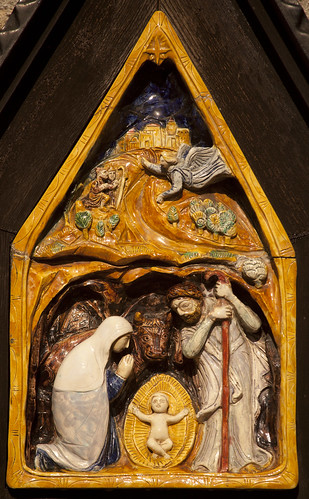 |
| The Christ Child with Our Lady and St Joseph: from the Rosary Walk at Aylesford Priory. |
Pope Francis, we all know, embraced an individual who has undergone gender reassignment. Having been born a woman, Diego Neria Legárrara now wants to be referred to as a man. The question of whether filling in a form in the local Registry Office (or the Spanish equivalent), and undergoing some kind of medical treatment, fulfills the ontological requirements for a person to change from one sex to another, is a philosophical question rather above Mgr Loftus' pay grade. But to help us he includes a substantial quotation from Pope Benedict XVI's speech to the Curia on 12th December 2012. It is a tour de force:
People dispute the idea that they have a nature, given by their bodily identity, that serves as a defining element of the human being. They deny their nature and decide that it is not something previously given to them, but that they make it for themselves.
According to the biblical creation account, being created by God as male and female pertains to the essence of the human creature. This duality is an essential aspect of what being human is all about, as ordained by God. This very duality as something previously given is what is now disputed. The words of the creation account: “male and female he created them” (Gen 1:27) no longer apply. No, what applies now is this: it was not God who created them male and female – hitherto society did this, now we decide for ourselves. Man and woman as created realities, as the nature of the human being, no longer exist. Man calls his nature into question. From now on he is merely spirit and will. The manipulation of nature, which we deplore today where our environment is concerned, now becomes man’s fundamental choice where he himself is concerned. From now on there is only the abstract human being, who chooses for himself what his nature is to be. Man and woman in their created state as complementary versions of what it means to be human are disputed. But if there is no pre-ordained duality of man and woman in creation, then neither is the family any longer a reality established by creation. Likewise, the child has lost the place he had occupied hitherto and the dignity pertaining to him. Bernheim shows that now, perforce, from being a subject of rights, the child has become an object to which people have a right and which they have a right to obtain. When the freedom to be creative becomes the freedom to create oneself, then necessarily the Maker himself is denied and ultimately man too is stripped of his dignity as a creature of God, as the image of God at the core of his being. The defence of the family is about man himself. And it becomes clear that when God is denied, human dignity also disappears. Whoever defends God is defending man.
I have emboldened what is not quoted by Loftus. He comments:
These strong words from Pope Benedict ... seem to fail to recognise that the Church has always been uncomfortable with absolute assignment of male or female gender to individuals. Medical science alone shows how there are those who either physically or psychologically are either unsure of of their gender identity, or are uncomfortable with it. They also seem to attribute a literal meaning to the Garden of Eden fable in the Bible, which no responsible Scripture scholar has sustained for the past 70 years.
Quite what Loftus could be thinking of when he says the Church is 'uncomfortable' with the two sexes he sadly fails to explain. What the metaphysical implications of being 'incomfortable' with one's gender might be, again, is not spelt out. But this embrace is taken, all the same, as casting Pope Benedict and his words into the scrap heap.
By contrast, Pope Francis 'dispenses the mercy which he experiences' Again:
 Actions speak louder than words. No words have come out of Francis' meeting with the transgender Spanish man and his girl-friend, but this action has re-inforced and clarified a lot of other things which Francis has said as Pope. In an intereview last March he spoke of "making sure that pastoral action takes into account that which is possible for people to do." ...
Actions speak louder than words. No words have come out of Francis' meeting with the transgender Spanish man and his girl-friend, but this action has re-inforced and clarified a lot of other things which Francis has said as Pope. In an intereview last March he spoke of "making sure that pastoral action takes into account that which is possible for people to do." ...And so Loftus witters on. Never does he claim in as many words that Pope Francis is in favour of sex-change procedures, or regards them as making an ontological change to the person undergoing them. And, obviously, Pope Francis hasn't done so: he has precisely said nothing in relation to this embrace, as Loftus has to concede. But somehow the reader is led to that conclusion anyway.
I think the outcome of the October Synod and in general the process of reform in the Church under Pope Francis is wide open to an unusual extent, but I think I can guarantee that we aren't going to be told that individuals like this Spaniard are going to be eligible, for example, for ordination to the priesthood. I fancy even Loftus doesn't harbour that fantasy. But that is the logical conclusion of this line of argument, and if we don't get to the conclusion, the argument hasn't worked.
As a service to the public, I have put together quotations on a range of themes from Loftus' published writings, mostly his Catholic Times columns, in a dossier here, and made one of his most theologically egregious articles, on the Resurrection of Our Lord, available here.
Support the work of the LMS by becoming an 'Anniversary Supporter'.
"whether filling in a form in the local Registry Office (or the Spanish equivalent), and undergoing some kind of medical treatment, fulfills the ontological requirements for a person to change from one sex to another, is a philosophical question rather above Mgr Loftus' pay grade."
ReplyDeleteSex is not a philosophical question - it is a biological question, more specifically one of genetics. Whatever changes these people attempt to make to their physiology by hormone treatment or surgery, every cell in their body retains the same sex chromosomes that they were born with. The woman embraced by the Pope may look like a man, but every cell in her body (except red blood cells which contain no genetic material) will continue to have 2 X chromosomes until the day she dies, and that includes all the new cells which are produced to replace the old ones which die.
Consequently she will never become a man and be capable of the biological functions which are particular to men. Like all these people, the best that she can hope to achieve is to occupy some kind of no-man's land based on the external appearances of sexuality.
"Gender dysphoria" is a mental physiological disorder and should be treated as if reality can be changed. Attempting to do so is akin to re-sculpting the body of a man who thinks he is a teapot accordingly. It is just another symptom of a world which cannot deal with the reality of being/essence/nature.
As for Loftus' claim that the actions of the Pope "clarify" a lot of things that he has said, I would say that the words "Francis" and "clarify" are rarely justifiably used in the same sentence except in a negative context.
UUuugh - 4th paragraph should read: "mental OR physiological disorder and should NOT be treated as if reality can be changed."
DeleteWhere did I put those lenses for my disordered vision?.
I'm no expert but I'm pretty sure sex-determination is more complex that the X-Y chromosomes formation, with some women being XY and some men being XX; not that the point would likely be relevant for this case.
DeletePlease, this is "O" Level biology! Sex-determination is everything to do with XY chromosome formation. There are rare cases of hermaphroditism where people are conceived with chromosomal abnormalities such as XXY, However, extra chromosomes bring with them other problems in a similar way that an extra chromosome 21 causes Down's syndrome.
DeleteThese so-called "transgender" types do not suffer from chromosomal abnormalities. It is a psychological condition which induces dysphoria - a feeling of being at unease with the body they were born with. It has been putatively linked to atypical development of the amygdala - particularly the insensitivity or hyper-sensitivity of testosterone receptors in that part of the brain. If the research proves to be accurate, it could lead to a pharmacological therapy for the condition, just as it is possible to control bipolar disorder or epilepsy by pharmacological means.
I recommend for collateral reading R. V. Young's "The Gay Invention:
ReplyDeleteHomosexuality Is a Linguistic as Well as a Moral Error"
http://www.touchstonemag.com/archives/article.php?id=18-10-036-f
There is also some useful discussion about Young's views of homosexuality in the comments section of this post: http://orthosphere.org/2012/05/14/the-manhood-deficit/
DeleteIn short I think Young is really on to something: it's important that the idea of "homosexuality" as a thing you are rather than a pattern of behaviors is relatively novel, and that (oddly) this attitude is insisted upon most by those who deny the very idea of unchangeable essences fixed by nature.
Notice the prestidigitation where sex (biologically determined) becomes gender (a social construct).
ReplyDelete